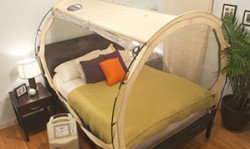
Altitude tents meet a need. On the Altitude Dream website there are dozens of names of cyclists, triathletes, swimmers and skaters who have worked with it. For a long time there was a haze around the height tents mystery. This was partly due to the nature of top sport. Top athletes are constantly experimenting with new things and like to keep that to themselves, especially if it provides benefits.
For a long time, doping fighters viewed the high altitude tent with suspicion. Former WADA chairman Pound called the tents "against the spirit of sport". They are intended to artificially improve performance without conscious effort. The body automatically produces extra red blood cells if it experiences an oxygen deficiency. Nevertheless, a number of years ago, after extensive discussion, it was decided not to take any measures against the tents. They do not cause any health damage and enforcement of a ban is hardly feasible. In some countries the use is considered unethical: in Norway and Italy for example.
Use of a height tent is considered unethical in some countries
Maarten van der Weijden, Olympic swimming champion, believes that WADA acted correctly in 2006 by releasing the height tents. 'If you forbid this, then the next step is to ban height training. And then the next step is to exclude people who naturally live at heights. That is not possible."
The development of technology cannot be stopped, thinks the swimmer. Perhaps other athletes will soon feel obliged to sleep in an altitude tent. According to him, it is nothing more than having to put on a certain type of swimsuit, because it is proven that it is faster.
"It's the natural development of sport. To be against high tents is almost the same as saying to me: 'you train so much that everyone who wants to win from you has to train as much. What kind of ridiculous life is that? But that's how the sport works. "
The interest of top athletes in height tents is also not surprising for exercise physiologist Gerard Rietjes. 'It offers many benefits. The athletes do not have to leave their own environment for mountains. It is cheaper than always at training camp. They can set the exact height themselves. This is useful because every person responds differently to the lack of oxygen. And they can 'sleep high and train low'. Live high train low, as it is called in the jargon. According to that method, which was also successfully followed by Maarten van der Weijden, athletes do rest and sleep at heights. As a result, they stimulate the body to produce extra red blood cells. On the other hand, they train in the environment they are used to at sea level. The body then does not have to adapt to the oxygen deficiency, such as in the mountains. Training can therefore be done with more intensity and quality.
